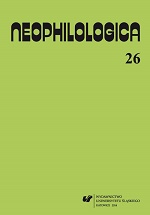Le concept cognitif d’événement
Event as a cognitive concept
Author(s): Jean-Pierre DesclésSubject(s): Language and Literature Studies
Published by: Wydawnictwo Uniwersytetu Śląskiego
Keywords: aspectualization; actualization on topological interval; open / closed interval; complete / completed; resulting state
Summary/Abstract: Starting from the basic aspectual distinctions between ‘state’, ‘event’ and ‘(incomplete) process’, an aspectualized predicative relation is actualized on a topological continuous interval of instants: open interval with a state; closed interval with an event; closed interval on the left and open interval on the right with an incomplete process. Some properties are closely linked to events: an event is surrounded by two states, a state before and a state after; it is generally not punctual hence it is compatible with durativity. A predicative relation which is aspectualized as an event is actualized on a closed interval but it is only true at the closed boundary on the right, the last instant of the event. An event can cover different events which are different parts of the global event. When a process is complete, it generates an event and also a resulting state at the last instant of the generated event; this last instant is a continuous cut (in Dedekind’s sense) between the event and the resulting state. An event can be only complete (as He painted the room for one day, in French : “accompli”) or completed (He painted the room in one day, in French : “achevé”): every completed event is complete but not vice versa.
Journal: Neophilologica
- Issue Year: 2014
- Issue No: 26
- Page Range: 7-22
- Page Count: 16
- Language: French

